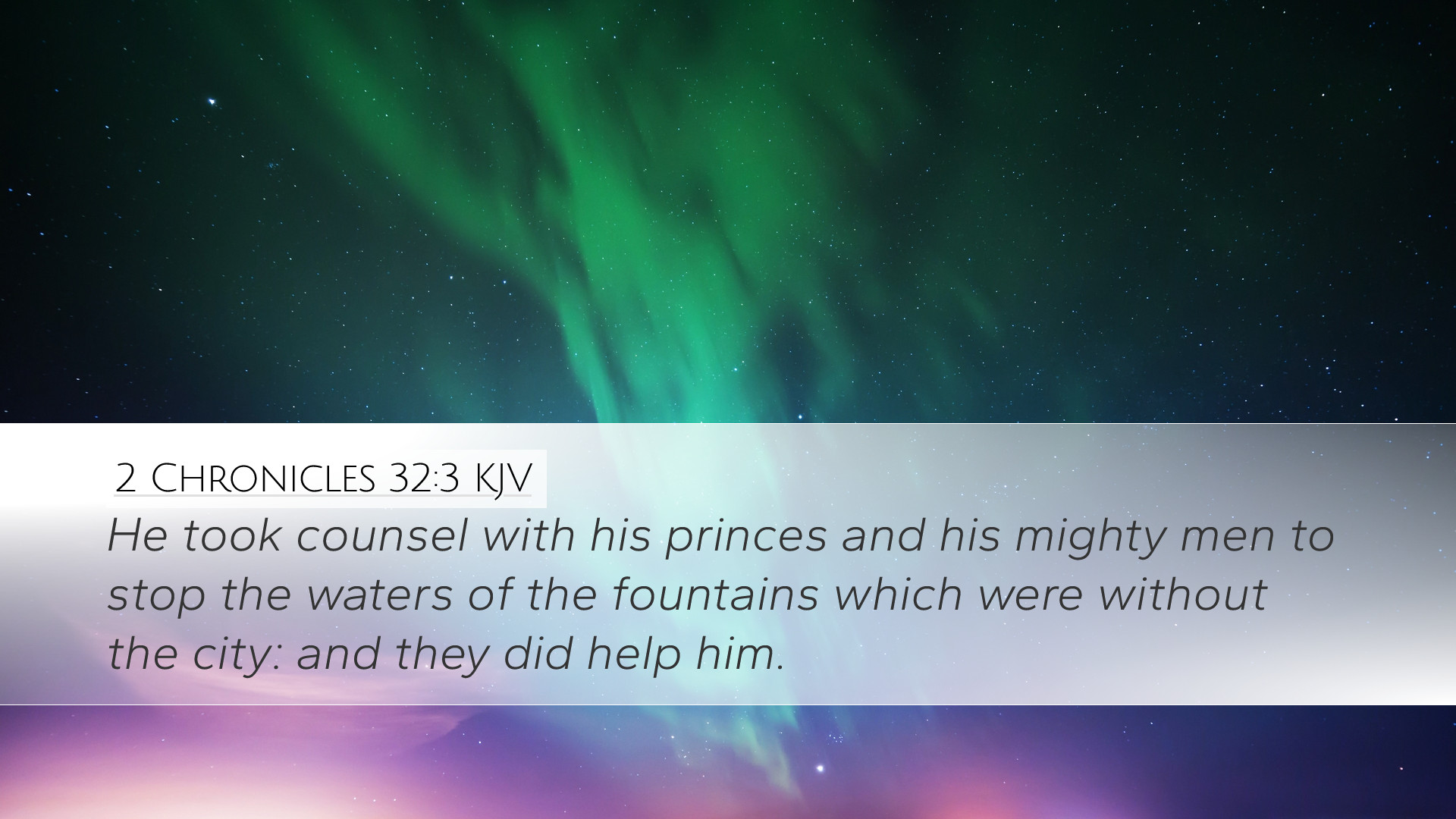Commentary on 2 Chronicles 32:3
In 2 Chronicles 32:3, we find an account of King Hezekiah’s response to the looming threat from the Assyrian king Sennacherib. The verse reads:
"He took counsel with his princes and his mighty men to stop the waters of the fountains which were without the city: and they did help him." This moment calls for an exploration of Hezekiah's leadership, the significance of the counsel he sought, and the literal and spiritual implications of stopping the waters.
Contextual Background
Hezekiah was one of the few kings of Judah who was commended for his faithfulness to God. His reign was characterized by religious reforms and a turning back to the worship of Yahweh. The Assyrian empire, under Sennacherib, posed a significant threat to the southern kingdom of Judah, leading to a crisis that tested Hezekiah’s leadership and faith.
Exegetical Insights
The phrase "took counsel with his princes and his mighty men" suggests that Hezekiah recognized the necessity of collaborative leadership. This highlights a key principle in governance and spiritual leadership: the importance of seeking wise counsel in times of crisis.
-
Matthew Henry’s Commentary: Henry posits that Hezekiah’s willingness to consult his leaders demonstrates humility and prudence—qualities critical for effective leadership. By engaging his commanders, Hezekiah not only shared the burden of decision-making but also reinforced unity among his people.
-
Albert Barnes’ Notes: Barnes emphasizes the necessity of strategic preparation in the face of impending danger. He indicates that the stopping of the waters was both a physical defense mechanism to hinder enemy movement and a symbolic act of reliance on God’s provision rather than human strength.
-
Adam Clarke’s Commentary: Clarke notes that the stopping of the waters represents a tactical foresight. It reflects a deeper spiritual truth: the need to guard against the spiritual drought that comes with negated faith and reliance on God during tumultuous times.
Spiritual Applications
From a spiritual perspective, this verse can be considered in light of common themes in biblical leadership:
-
Collaboration in Ministry: Just as Hezekiah sought counsel, modern-day leaders are encouraged to work collaboratively. No leader is an island, and it is through mutual support that churches and ministries thrive.
-
Preparing for Conflict: The verse invites reflection on the readiness of the church to face adversities. Hezekiah’s efforts were not merely about self-defense; they were aligned with a divine purpose—preserving the worship of God in Judah amidst threats.
-
Trust in Divine Provision: Hezekiah’s actions underscore a reliance on God’s strength. Today's leaders are reminded that even as they take strategic actions, trust must remain rooted in God’s promises and faithfulness.
Historical Reflections
Historically, this narrative illustrates the pivotal moments in Israel’s history where leadership was marked by faith and decisive action. Hezekiah’s reign showcases the struggle between faithfulness to God and the realities of human opposition, a theme that recurs throughout Scripture.
Conclusion
In summary, 2 Chronicles 32:3 serves as a vital reminder for leaders and believers alike. It calls for proactive measures in the face of challenges while emphasizing the significance of seeking wise counsel and collective effort. The ultimate message remains clear: while leaders must act, they must do so with a reliance on divine wisdom and strength, fostering an environment where faith can flourish even amidst crises.


